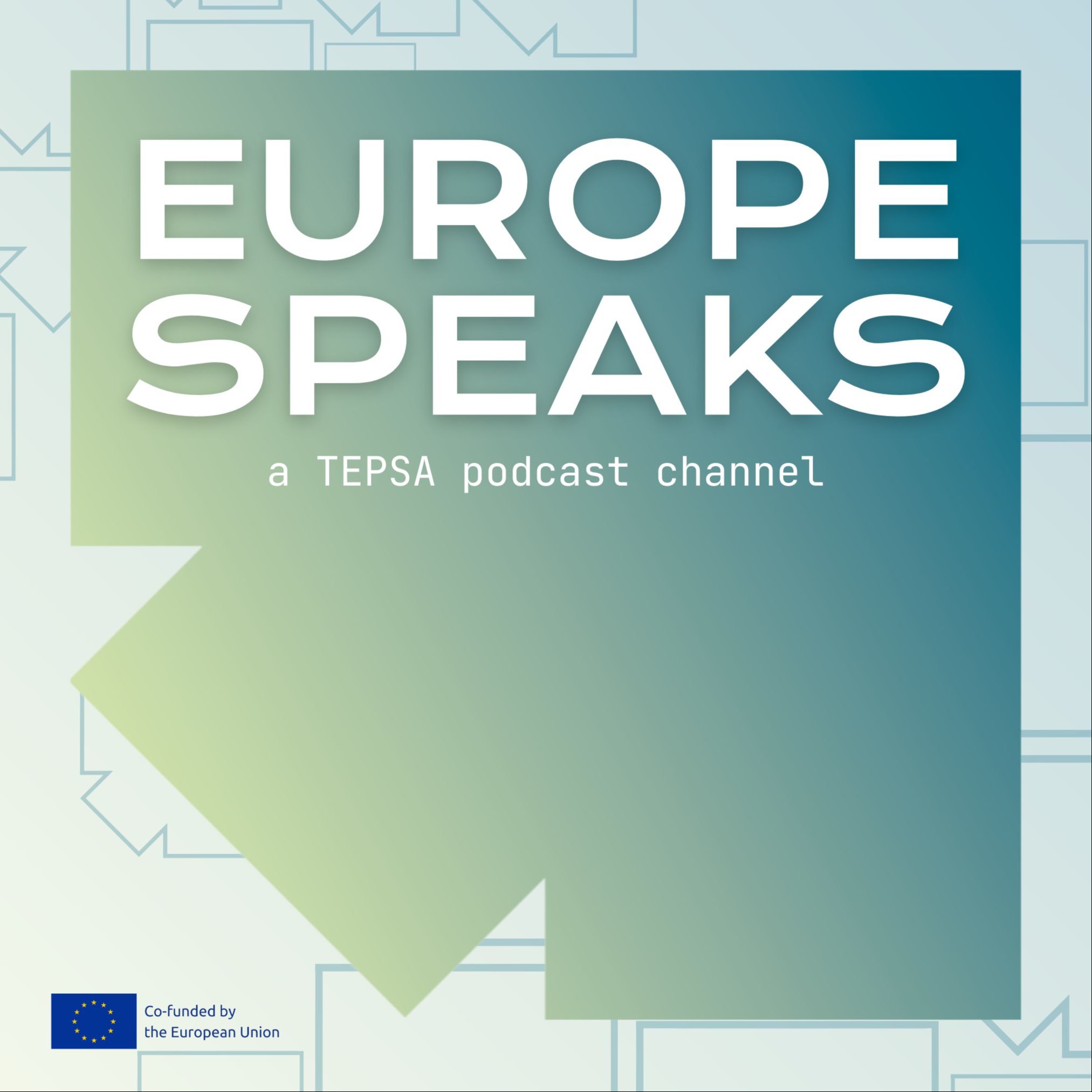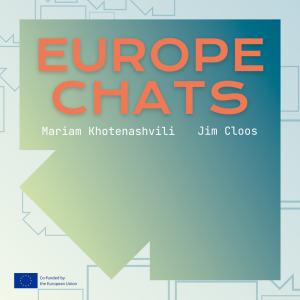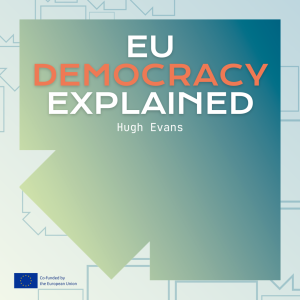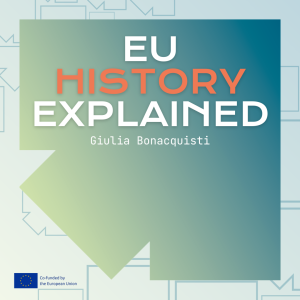
Welcome to ‘Europe Speaks’, a podcast channel by the Trans European Policy Studies Association (TEPSA) where we explore everything to do with the European Union: history, current affairs, and the future of Europe. We publish regular podcasts on all these topics, including EuropeChats with Jim Cloos and Mariam Khotenashvili, and a series of other webinars, explainers, and interviews with the world’s leading experts on the EU!
Episodes

Thursday Apr 18, 2024
Thursday Apr 18, 2024
This episode of EuropeChats is the first in a number of discussions both within and outside of the EuropeChats series that TEPSA and its Member Institutes are conducting to mark the fiftieth anniversary of the European Council. In this discussion, TEPSA Secretary-General Jim Cloos sits down with former Belgian Prime Minister and the first ever permanent President of the European Council: Herman Van Rompuy.
President Van Rompuy has experiences different iterations of the European Council from different perspectives: he first joined the club as Belgian Prime Minister before the Lisbon Treaty entered into force and where Foreign Ministers where thus still taking part in the meetings. Then, when he became the Institution's first permanent President, he held the position in the iteration of the EUCO currently extant in the Treaties. All of this at a time where the EU's early 21st century so-called 'perma-crisis' was gathering momentum, with the fallout of the 2008 Global Financial Crisis continuing into the 2010s, and the early days of the Refugee Crisis coming to the fore towards the end of his tenure.
This episode is a discussion with Herman Van Rompuy. President Van Rompuy was Prime Minister of Belgium from 2008-2009, President of the European Council 2009-2014, and is Honorary President of the European Policy Centre. EuropeChats is the flagship podcast of TEPSA and it is part of the TEPSA Podcast Channel “Europe Speaks”
Music: Worakls, 22 September 2014, Salzburg, Hungry music
This video is co-funded by the Citizens, Equality, Rights and Values programme of the European Union
Co-Funded by the European Union.

Friday Apr 05, 2024
Friday Apr 05, 2024
This episode of EuropeChats is a discussion between Gert Jan Koopman, Director-General of the Directorate-General for Neighbourhood and Enlargement Negotiations (DG NEAR), and TEPSA Executive Director Mariam Khotenashvili. The discussion focuses on the current prospect of the EU enlargement file. With the accession agenda firmly in the foreground of European politics once again, thanks to recent decisions to start accession negotiations with Ukraine and Moldova (agreed in December 2023 European Council) as well as with Bosnia and Herzegovina (agreed in the March 2024 European Council), it is more crucial than ever to explore the ins and outs of enlargement policy, and discuss the ways forward for EU candidate countries.
In particular, the discussion focuses on topics such as the 50 billion euro Ukraine Facility as well as the 6 billion euro Reform and Growth Facility for the Western Balkans. In addition, Mariam and Gert Jan cover difficult issues such as citizens' (particularly farmers') concerns about the effects of Ukrainian grain exports on the EU's internal market and competitiveness, and a climate of disinformation surrounding the future accession of candidate countries.
This episode is a discussion with Gert Jan Koopman. Gert Jan is the Director-General of DG NEAR, with an ambitious agenda for strengthening integration between the EU and its neighbours. He has also previous worked on economy and competition policies and was in charge of the EU budget.
EuropeChats is the flagship podcast of TEPSA and it is part of the TEPSA Podcast Channel “Europe Speaks”
Music: Worakls, 22 September 2014, Salzburg, Hungry music
This video is co-funded by the Citizens, Equality, Rights and Values programme of the European Union
Co-Funded by the European Union.

Tuesday Dec 19, 2023
EU Democracy Explained – Is the EU Democratic? Part 3 – the European Parliament
Tuesday Dec 19, 2023
Tuesday Dec 19, 2023
In this series from the Trans European Policy Studies Association (TEPSA), Hugh Evans explores the ways democracy weaves its way in and out of the EU system.
This episode tackles the institution that you might already be most familiar with: the European Parliament. We will learn about its history dating all the way back to the 1950s and about what developments over the course of that period have served to increase the quality of representation, accountability, and ultimately democracy within it. We will also tackle a crucial concept in democracy theory: representation. While you might think you already know about this concept, there is more to the theory of representation than you might think, and its nuanced and vital role in democracy is implemented in a unique way in the EU system,
EU Democracy Explained is a series where we delve into detail about what democracy actually is and how it works in Europe, and ask ourselves: “what makes the EU democratic?”
Script, Recording & Editing: Hugh Evans
Music: Wondershare Filmora X.
Co-funded by the European Union. Views and opinions expressed are however those of the author(s) only and do not necessarily reflect those of the European Union or European Education and Culture Executive Agency (EACEA). Neither the European Union nor the granting authority can be held responsible for them.

Monday Dec 18, 2023
Monday Dec 18, 2023
O’Sullivan
This episode of EuropeChats is a discussion on the implementation and effectiveness of EU sanctions against third countries, with a particular focus on Russia. TEPSA Secretary-General Jim Cloos is joined by EU Sanctions Envoy David O'Sullivan and a leading expert on sanctions, Dr Clara Portela from the University of Valencia. Sanctions are a key tool in the EU's external policy, and can be employed in a variety of ways and with a variety of possible aims and outcomes.
The most recent high-profile occasions in which the EU has chosen to impose sanctions on a third country is in a series of sanctions packages preceding and in the aftermath of Russia's aggression of Ukraine, which started in February 2022. Throughout the ensuing war, the EU has continued to ramp up its sanctions measures, and this episode discusses their implementation and effectiveness.
EuropeChats is the flagship podcast of TEPSA and it is part of the TEPSA Podcast Channel “Europe Speaks”
Music: Worakls, 22 September 2014, Salzburg, Hungry music
This video is co-funded by the Citizens, Equality, Rights and Values programme of the European Union
Co-Funded by the European Union.

Friday Dec 15, 2023
Friday Dec 15, 2023
In this series from the Trans European Policy Studies Association (TEPSA), Hugh Evans explores the ways democracy weaves its way in and out of the EU system.
This episode revolves around one of the institutions in the EU triangle that represents one of the two poles of the EU’s dual legitimacy: the Council of the European Union – legitimacy via the 27 governments. We will explore its makeup, its role and internal functioning, and we’ll discover what its crucial role in the legislative process might mean in terms of defining what the EU actually is.
In addition, we will learn about the complex academic debate surrounding the question of defining the EU as an entity. In exploring different theories of European integration and functioning, we will discover what aspects of the system conform to the various theories.
EU Democracy Explained is a series where we delve into detail about what democracy actually is and how it works in Europe, and ask ourselves: “what makes the EU democratic?”
Script, Recording & Editing: Hugh Evans
Music: Wondershare Filmora X
Co-funded by the European Union. Views and opinions expressed are however those of the author(s) only and do not necessarily reflect those of the European Union or European Education and Culture Executive Agency (EACEA). Neither the European Union nor the granting authority can be held responsible for them.

Friday Dec 08, 2023
Friday Dec 08, 2023
This episode of EuropeChats is a discussion on a crucial question for the EU in 2024: what will the next Strategic Agenda look like?.
Every five years, EU leaders agree on the EU's political priorities for the future. It is a collective effort led by the President of the European Council, where leaders discuss and decide together. It takes place in the context of the European Parliament elections and ahead of the appointment of each European Commission.
Given the way Belgium has chosen to structure its Presidency of the Council of the European Union for the first half of 2024, the 6 months immediately preceding the finalisation of the Strategic Agenda, such that its second half can be dedicated to supporting the formulation of that Agenda, TEPSA Secretary-General Jim Cloos speaks with Wouter Detavernier, who is the Deputy Directory-General for European Affairs and Coordination at the Belgian Ministry of Foreign Affairs. Richard Youngs, Senior Fellow at Carnegie Europe and TEPSA Board Member, joins the discussion too, in order to give his expert insights as a researcher.
EuropeChats is the flagship podcast of TEPSA and it is part of the TEPSA Podcast Channel “Europe Speaks”
Music: Worakls, 22 September 2014, Salzburg, Hungry music
This video is co-funded by the Citizens, Equality, Rights and Values programme of the European Union
Co-Funded by the European Union.

Wednesday Dec 06, 2023
EU Democracy Explained – Is the EU Democratic? Part 1 – the European Commission
Wednesday Dec 06, 2023
Wednesday Dec 06, 2023
In this new series from the Trans European Policy Studies Association (TEPSA), Hugh Evans explores the the ways democracy weaves its way in and out of the EU system.
This first episodes revolves around a crucial and unique EU institution: the European Commission. We will explore how the Commission works, learn about its history, and discover how a proposal gets passed in the institutional triangle. In addition, we will explore an important element of what makes the EU democratic: accountability. Many people worry that the Commission is not accountable, but despite the caricature of 'Brussels bureaucrats', the truth is very different - this video explains how accountability is crucial in the European Union.
EU Democracy Explained is a series where we delve into detail about what democracy actually is and how it works in Europe, and ask ourselves: “what makes the EU democratic?”
Script, Recording & Editing: Hugh Evans
Music: Wondershare Filmora X
Co-funded by the European Union. Views and opinions expressed are however those of the author(s) only and do not necessarily reflect those of the European Union or European Education and Culture Executive Agency (EACEA). Neither the European Union nor the granting authority can be held responsible for them.

Monday Jul 03, 2023
Monday Jul 03, 2023
This episode of EuropeChats is a discussion between Jim Cloos, TEPSA Secretary-General and former Director General for General and Institutional Policy at the General Secretariat of the Council, and TEPSA Executive Director Mariam Khotenashvili. The discussion focuses on a topic which comes around every six months in EU affairs: the Rotating Presidency of the Council of the European Union.
The Rotating Presidency is system whereby each of the 27 EU Member States takes turns in chairing various formations of the Council of the European Union. Each Presidency lasts six months and always has its own priorities. The system is a way for Member States to each hold the reins of a key EU Institution on an equal basis, and the Presidency plays a key role in many of the legislative achievements of the European Union.
In particular this episode is a discussion on the history, role, and relevance of the Rotating Presidency, drawing on Jim Cloos' longstanding involvement in Presidencies, first as a Luxembourgish diplomat, then as a European diplomat. Together, Mariam and Jim explore the support each Presidency gets from the General Secretariat of the Council, what challenges Presidencies may face, what opportunities they have to make a difference, and they try to answer a key question: what makes a good Rotating Presidency?
At the time of this episode's publication, Spain has just taken the reins of the Rotating Presidency from Sweden. For the coming six months, the new Presidency will have to tackle a number of challenges both at the national and European elections, not the least of which is a national election in Spain set for July 23. TEPSA has been working hard to give concrete recommendations to the Spanish Presidency, via the holding of a Pre-Presidency Conference in Madrid at the start of June, and via the presentation of a set of policy recommendations in various areas. To learn more about the Recommendations from Members of the TEPSA Network to the Spanish Presidency, check out our website: https://www.tepsa.eu/recommendations-from-members-of-the-tepsa-network-to-the-spanish-presidency/
EuropeChats is the flagship podcast of TEPSA and it is part of the TEPSA Podcast Channel “Europe Speaks”
Music: Worakls, 22 September 2014, Salzburg, Hungry music
This video is co-funded by the Citizens, Equality, Rights and Values programme of the European Union
Co-Funded by the European Union.

Friday Jun 16, 2023
Friday Jun 16, 2023
This episode of EuropeChats is a discussion between Frank Schimmelfennig, Professor of European Politics at ETH Zürich, and TEPSA Executive Director Mariam Khotenashvili. The discussion focusses on building a new future for EU enlargement. With the accession agenda firmly in the foreground of European politics once again, thanks to the new candidacy of Ukraine and Moldova, it is more crucial than ever to explore the ins and outs of enlargement policy, and discuss how to improve it.
In particular, an in the context of potential future enlargement in the Western Balkans, the discussion focusses on the update to enlargement methodology which was made in 2020 for the purpose of reinvigorating the accession process for candidates in that region. In addition, Mariam and Frank discuss the thorny issues of the EU’s “absorption capacity”, the prospect of “staged accession”, and the costs of non-enlargement geopolitically, economically, and in terms of the EU’s internal functioning.
This episode is a discussion with Prof. Frank Schimmelfennig. Frank is Professor of European Politics and a member of the Center for Comparative and International Studies at ETH Zürich. He is a leading expert on all things EU integration, and a key protagonist in the current debate about the accession process and enlargement policy writ-large. His new book, “Integration and Differentiation in the European Union”, was recently published by Palgrave Macmillan.
EuropeChats is is the flagship podcast of TEPSA and it is part of the TEPSA Podcast Channel “Europe Speaks”
Music: Worakls, 22 September 2014, Salzburg, Hungry music
This video is co-funded by the Citizens, Equality, Rights and Values programme of the European Union
Co-Funded by the European Union.

Wednesday May 24, 2023
EU History Explained - From the EEC to today’s European Union
Wednesday May 24, 2023
Wednesday May 24, 2023
In this new episode of EU History Explained, Giulia Bonacquisti, Programme Manager at the Trans European Policy Studies Association (TEPSA), takes a look at the recent history of the European project, with a focus on how we came from debating what form integration should take in the 1960s and 1970s to the formalisation of much of what we recognise today as the European Union through the Single European Act, Maastricht Treaty, and eventually through the Lisbon Treaty, which is still in force today.
In this video, we discuss how, from the purely economic integration project of the European Economic Community, created in 1957, we ended up with today’s European Union: a complex structure comprising not only a single market, but also common policies, as well as rights and obligations for European citizens. Today’s European Union is a polity which, among other things, allows us to circulate freely across Member States, to live and work abroad, to participate in local and European elections in other countries, and to feel part of one big family with our fellow Europeans. But it is also an ongoing process that cannot yet be considered achieved. As the Treaties say, the EU is permanently striving to build “an ever closer union among the peoples of Europe”, and even today a broad debate is taking place about the future of the EU and the reforms needed to make it more effective and closer to citizens, including young people.
EU History Explained is TEPSA’s video series exploring the origins of the modern EU. If you have ever wondered how the European Union of today came to be, or what lies behind the talk of politics being shaped in ‘Brussels’, then this is the series for you!
We would like to thank the Historical Archives of the European Union at the European University Institute for their contribution.
Script: Giulia Bonacquisti
Recording & Editing: Eva Ribera & Hugh Evans
Music: Garrett Bevins - Infinite - Infinite (Wondershare Filmora X)
